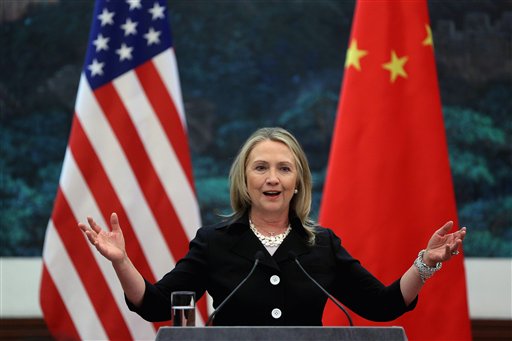By MATTHEW LEE
Associated Press
BANDAR SERI BEGAWAN, Brunei
U.S. Secretary of State Hillary Clinton said Thursday that her talks in China this week were useful despite highlighting sharp differences between Washington and Beijing over key international issues from Syria’s civil war to territorial disputes in the South China Sea.
Clinton was criticized in official Chinese media during the visit, and she exchanged blunt words with Foreign Minister Yang Jiechi over how to end the bloodshed in Syria. She and Yang also pointedly disagreed over the South China Sea, where the Obama administration fears tensions stoked by nationalism will continue to rise over competing claims between China and its smaller neighbors, some of whom have their own overlapping claims.
She said she personally and the U.S. were “not going to shy away from standing up for our strategic interests and in expressing clearly where we differ.”
China is resisting a push by the U.S. and other countries for U.N. sanctions against Syria to put pressure on President Bashar Assad’s regime, saying the civil war there must be resolved through negotiations. Beijing also wants to negotiate several territorial disputes over the resource-rich South China Sea individually with its neighbors, rejecting the speedy implementation of a code of conduct to prevent clashes and multilateral negotiations that the U.S. advocates.
A senior U.S. official traveling with Clinton from East Timor to Brunei, a member of the Association of South East Asian Nations that has claims in the disputed waters, said Washington believed that there would be a period of higher tensions for some time to come “no matter what” progress may be able to be made.
The United States has said the peaceful resolution of South China Sea disputes is in the U.S. national interest, mainly due to maritime security and the safety of international shipping. However, speaking next to Clinton on Wednesday, Yang said the disputes were no one’s business but the “directly concerned” countries.
Clinton said Thursday that “the mark of a mature relationship, whether it is between nations or between people, is not whether we agree on everything _ because that is highly unlikely between nations and people _ but whether we can work through the issues that are difficult.”
She said it was important for the U.S. and China to talk ahead of a number of international gatherings, including the Asia-Pacific Economic Cooperation summit this weekend in Vladivostok, Russia, the U.N. General Assembly and the East Asia Summit.
Clinton is winding down an 11-day, six-nation tour through the Asia-Pacific. After stops in the Cook Islands, Indonesia, China, East Timor and Brunei, she heads to Russia on Friday for the APEC forum.

COMMENTS
Please let us know if you're having issues with commenting.